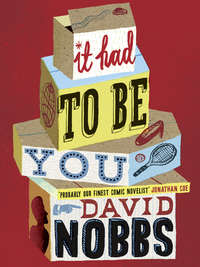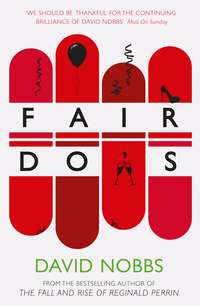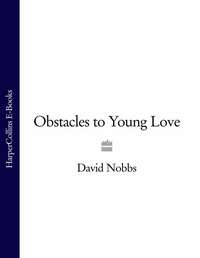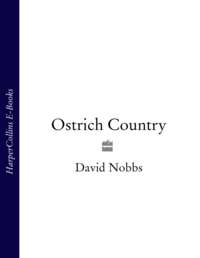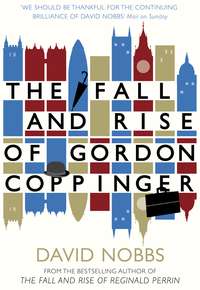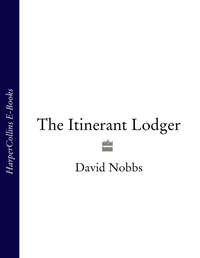
Полная версия
Ostrich Country
They read the Sunday Times, each a different section, having nothing much to say to each other now. Diana was sixteen, still at school and too young for conversation. Morley was twenty-eight, a prematurely elder brother, serious, with slow movements and long anecdotes, a leader writer on a Yorkshire daily, a future pundit.
Pegasus felt nervous. He hadn’t told the family yet, and it would be hard. He was firmly expected to bring Grimsdike Crescent its first Nobel Prize. He wanted to tell Morley and Diana, but couldn’t begin.
‘Come and get it,’ said their father at the french windows.
They went and got it, Pegasus immediately, Morley gradually, Diana deliberately the last of all. There was wine — a rare treat.
‘After all,’ said his father, ‘it’s not often we’re all together.’
Pegasus was irritated by this apology. If the Shah of Persia had been there, what would he have thought? And he was irritated by his own irritation. A bottle of wine was an extravagance.
It had meant financial sacrifices bringing up the children. It had meant frayed carpets, a rusty lawn-mower, Radio Times but no T. V. Times, an old decrepit car. Pegasus felt that it was his irritation, not his father’s apology, of which the Shah of Persia would disapprove. And even now Paula was making love to a man who translated Ogden Nash into Latin. At this moment while Pegasus was chewing Yorkshire pudding she was biting gently at the thick dark hairs on that odious young man’s revoltingly hairy arms, while he mouthed sweet hexameters into her ear.
‘What’s wrong, Pegasus, aren’t you hungry?’
‘I was thinking.’
‘I hope you aren’t sickening for something.’
‘No, mother, I’m not sickening for anything.’
‘Well, anyway,’ said his mother, ‘it is nice, all being together like this.’
‘Quite a family,’ said his father.
‘I think Morley’s gone a lot more dour since he went up North,’ said Diana.
‘My library book’s set in the North,’ said his mother. ‘I can’t get into it. I don’t like sordid books.’ (Murmurs of dissent.)
‘There’s nothing sordid about the North,’ said Morley.
‘Except what the bosses plunged it into in the industrial revolution,’ said Diana.
‘The distinctions drawn between the North and the South are a romantic myth,’ said Morley. ‘We try to see in the North the kind of strength and simplicity we would like to have.’
‘There are some very nice parts of the North,’ said his mother. ‘Your father and I are very fond of Wensleydale, aren’t we George?’ (Uproar.)
‘We’re talking about the real North,’ said Diana.
I must join in. I must say something. I mustn’t put myself at a distance.
‘Anyway this Yorkshire pudding is very good,’ said Pegasus.
How old his mother was, he thought. Shrinking. Hardly more than five foot tall these days. Liable to disappear by 1990 at this rate. Beginning to call him Diana by mistake. She had aged at the same rate as him, and so he had never noticed it. She had been there, busy about the house, not sparing herself, a familiar landmark, twenty-five years older than he was. Now overnight she was old. She was a human being. She had been young. He knew nothing about her.
‘It’ll be warm enough to sit outside,’ said his father.
His father looked a little strained, a little haggard, a little baggy. His father too was very pleased about his scientific leanings.
‘The temperamental differences between Yorkshire and Lancashire people are considerably more radical than the difference between say Pontefract and Bedford,’ said Morley, droning on.
Short work was made of the washing up. It was found to be just possible to sit outside in the deck-chairs, in a sheltered corner of the garden.
They drank their coffee, while all around them the first lawn-mowers of spring whirred, and above them aeroplanes came in towards London Airport bringing carefree foreigners, and over the road Mr Munsford lovingly touched up his repulsive topiary with a very special pair of clippers. Suddenly, in a brief gap between planes, Pegasus took the plunge.
‘I’m leaving my job,’ he said. ‘I’m going to be a chef.’
He was ashamed. The Shah of Persia would never have been so embarrassed about so minor a matter.
‘You can’t mean it,’ said his mother.
‘A chef?’ said Morley incredulously.
‘Good God,’ said Diana.
‘This is a bit late for April fools,’ said his father.
‘I’ve taken a job as vegetable chef in a hotel in Suffolk.’
‘It’s a bit of a waste of a good second in science, isn’t it?’ said Morley.
‘It’s my life.’
‘You had a good career at the institute,’ said his father. ‘Aren’t you a bit of a fool to give all that up?’
‘Mad,’ said Morley.
‘Shut up!’ said Diana.
‘I found it grotesque,’ said Pegasus.
He longed to pass overhead in one of those planes.
‘But the catering trade,’ said his mother, wrinkling the nose of her voice in disgust.
‘You make it sound so sordid,’ said Pegasus.
‘I think food’s a jolly good thing to go into,’ said Diana.
‘You aren’t as old as he is,’ said their mother.
‘And you’re a girl,’ said their father.
It began to pour, a sharp gusty shower. There was a general rush indoors with rapidly folded deck-chairs. The business section of the Sunday Times floated off towards Hillingdon. The rain, which George Baines had not forecast, had saved the situation.
They all disappeared, his father to finish some graphs, his mother to bake a cake, Morley to pack, Diana to go over to Ursula’s to do some French. Pegasus recognized this ploy. He was now expected to do the rounds and be lectured by each in turn. If he didn’t, they would all come to him.
He followed Diana up to her room.
‘Thanks, Di, for backing me up,’ he said. ‘You know it’s rather nice in here.’
‘Naturally.’
She was busy with her face.
‘You like to be at your loveliest when you do your French, do you?’
‘Of course.’
She came up to him with swift movements and kissed him on the lips with her round rather jolly face.
‘You’re a sweetie,’ she said, and then slapped him hard on the bottom and left the room without turning round. He watched her swinging aggressively up the road with her broad hips and slightly muscular white-stockinged Sunday afternoon in Uxbridge legs.
He went out into the corridor.
‘Is that you, Pegasus?’ called Morley.
He went into the bedroom which he shared with Morley when they were both at home.
‘You aren’t doing this on the spur of the moment, are you?’
‘You’re off duty now, Morley. I’m your brother, not a public issue.’
He slammed Morley’s door behind him.
‘Is that you, Pegasus?’ his father called.
His father was at the bedroom window, watching the rain.
‘Have you really thought this out, old chap?’ he said.
‘Of course,’ said Pegasus.
‘I wouldn’t like to feel you were wasting your life.’
‘Food isn’t wrong, you know, father.’
‘Well there you are, you see. Times change. Your mother and I can’t quite share your attitude to that. And it’s your mother I’m thinking of, Pegasus. This is a difficult time for her.’
‘Why?’
‘It just is. Take my word for it. Look at this dreadful rain, Pegasus.’
‘M’m.’
‘Well I’m sorry to be such a bore but that’s what parents are like. You’ll be one yourself one day.’
Pegasus went out on to the stairs without asking his father how he knew.
‘Is that you, Pegasus?’ said his mother.
She was busy in the kitchen with her mixture.
‘I hope you’re doing the right thing, Pegasus,’ she said.
‘Food isn’t wrong, you know, mother.’
‘Well there you are, you see. We saw the depression. And your father’s very set on your being a scientist.’
‘Well, I’m sorry, mother.’
‘Your father’s a good, sincere man, Pegasus. And good at his job, too. What he doesn’t know about warm fronts isn’t worth knowing.’
‘I’m sure.’
He saw her sniffing, from habit, to see if he was changing his socks often enough. She always did this. Not that he had antisocial feet.
‘If your father couldn’t forecast this rain, nobody could.’
‘I’m sure.’
‘I don’t want him hurt, that’s all,’ said his mother. ‘We want success for you, Pegasus.’
He looked her straight in the face and what he saw there was love.
After tea he drove Morley to St Pancras. They hardly spoke.
He was longing to see Morley off on to his train. There would just be time to go down to Kensington Gardens before it got dark.
‘There’s no need to come on to the platform,’ said Morley.
‘I insist,’ said Pegasus.
He was irritated with Morley. He was irritated with his parents. He was irritated with Diana for not returning before he left. He was irritated with himself. And the showers had given way now to a soft, remorseless rain.
George Baines watched the rain morosely. They’d be returning now, wet and sad and bedraggled, from Brighton and Worthing and Bognor. George Baines saw their reproachful faces as they stood at the bottom of the garden. ‘You were wrong,’ they said. ‘You, with all your scientific apparatus, you were wrong.’
‘Come away from the window, dear,’ said his wife Margaret. ‘You won’t make it stop, you know.’
George Baines came away from the window and sat down opposite his wife.
‘Never mind,’ he said, and then he added, as if he was speaking about some modern phenomenon that he didn’t understand. ‘Food’s on the up and up, you know.’
‘I suppose so.’
George Baines stared at the Constable over the mantelpiece. Looked like a settled spell down there in Flatford.
‘Diana’s late,’ said his wife Margaret.
Diana was kissing Stephen in the back room of number 11, Honiton Drive. Stephen’s parents were in Paris, on business. They were often in Paris, on business. When his elder brother Peter had been left at home alone he had invited no less than sixty-three people to a party. Several of them had been drug addicts. Many had stayed all night, getting to know each other better in various parts of the house and garden. A Vlaminck lithograph had been pressed into service as a drinks tray, with deleterious results, and the crocuses had been trampled beyond recognition. Stephen’s parents believed that you had a moral obligation to trust your children, especially when cancelling a trip to Paris was the alternative.
Diana kissed Stephen’s gorgeous, angelic face. She loved boys with gorgeous, angelic faces.
The rain fell on Tarragon Clump’s bonnet as he drove home along the wet, dreary Sunday roads. He had been to see his family, the Clumps of Gloucestershire. He stopped off at Oxford and went to see a film in a huge, half empty cinema. It was a rotten film but it had Pamela Blossom in it, in scanty attire.
The rain fell on Pegasus as he sat on the seat in Kensington Gardens and watched the light beginning to fade from a dismal, featureless sky. In the distance, beyond the Round Pond, there was a woman. It could be Paula. She was coming nearer, a figure from the fieldcraft manual. At 800 yards Paula was a blur. At 700 yards Paula’s face was a blob, her legs matchsticks. At 500 yards, Paula’s attractive, slightly fleshy legs began to be visible. At 400 yards it was possible to make out Paula’s biteable narrow nose. At 300 yards it wasn’t Paula at all, but an elderly woman in thick, brown stockings.
He closed his eyes and tried to construct a half-dressed Paula in her suspenders. In vain. He tried to feel the old misery, the betrayal, the silent tears. Nothing.
He looked round the park, his oasis even in the rain. Here he was at dusk, drinking at his waterhole, leaving his Saxone hoof-prints in the wet grass. But this scene too aroused no emotion in him any more. He was cured. How sad life was.
He began to walk away, a little ashamed. You wouldn’t catch the Nawab of Pataudi hanging around a seat in Kensington Gardens.
He went into a pub and bought himself a pint of bitter. He didn’t feel like going back to Hampstead yet, if ever.
His flatlet was full of purple-sprouting broccoli. He had meant to devote the evening to it. He had bought three cookery books and had promised himself three hours’ practice a night.
His landlord, Mr Lal, had been furious. ‘What are all these good vegetables doing in my dustbins?’ he had said. ‘Don’t you know that in my country there is famine?’
So the next evening Pegasus had taken plate after plate of cooked vegetables to Mr Lal. Later that evening he had seen Mr Lal taking them to the dustbin.
He’d tried throwing them down the lavatory. It had blocked. The water had failed to run out properly after Miss Yarnold’s Thursday bath. Mr Waller had used the plunger on it, there had been a loud prolonged gurgle, and several pieces of diced parsnip had floated up into the bath. Miss Yarnold had looked embarrassed, as though she felt responsible for them. The plumber, coming to unblock the lavatory, and seeing all the vegetables, had said in surprise: ‘These haven’t hardly been digested at all.’ Mr Lal had gone steadily berserk.
It had all served to dampen Pegasus’s enthusiasm. He was beginning to fall behind. He would persist, but not tonight. He wouldn’t do his three hours tonight.
He took a large draught of beer, as if defying the world.
Simon was giving Paula dinner in his flat. He liked to give her dinner in his flat, after evensong.
‘I wish you’d let me cook for you,’ said Paula.
‘Plenty of time for that when we’re married,’ he said.
Four months. Four months before she was in his fine, manly, hairy arms. Simon knew that she wasn’t a virgin. He had forgiven her.
‘Lovely pâté, darling.’
‘A trifle coarse?’
‘I don’t think so.’
He didn’t like going to her flat and he didn’t like going out too often. Only occasionally did she manage to drag him to the pictures. He didn’t mind the films but he hated the intermissions. He was a merchant banker. Paula had rarely been to church before, but funnily enough she quite enjoyed it. Dark. Cool. Colour high up. Earl Grey Tea and Simon’s dark face bent over a sheet of paper. Small precise writing. Ink, of course.
‘Why Ogden Nash?’
‘Why not?’
‘Well I mean the whole point of Ogden Nash is the funny length of his lines. Isn’t all that lost when you put them in hexameters?’
‘But that’s the challenge. That’s the whole fun of it.’
‘I’m not criticizing. I’m just trying to get your point of view.’
‘Whatever the length of Nash’s lines I must turn each one into a hexameter. It’s a discipline. I’m not trying to reproduce his humour.’
‘No.’
‘I couldn’t, if I tried.’
‘No.’
‘Canon Mulgrave was on form tonight, I thought.’
‘Yes, very good. I wasn’t criticizing, Simon.’
‘I wouldn’t mind if you were.’
There were watercolours of hunting scenes on the walls. Simon hated hunting but liked watercolours of hunting scenes. A small thing, but irritating.
Pegasus drank on, thinking about the Goat and Thistle. She was an attractive woman. She had given him the job without references of any kind. He believed that this was because they had established an unspoken rapport. It looked a nice hotel. And he liked Suffolk. Though presumably she was married.
5
Pegasus arrived to find that he was staying not in the hotel but at Rose Lodge, a little early Victorian lodge cottage at the back of the village, on the entrance to Lord Noseby’s estate. In the car on the way over from the hotel Patsy explained that the staff quarters were full because there was Tonio, the assistant chef, living in and Bellamy the porter and Miss Coward the receptionist and part-time barmaid and also Patsy herself because her aunt had come to stay with them while her uncle was in hospital which looked likely to drag on for some time on account of his liver. Bill Gunter was Lord Noseby’s gamekeeper, but his wife Brenda was Patsy’s co-waitress, so it wouldn’t be like being with strangers.
Brenda Gunter greeted Pegasus warmly. She was a pretty woman with good sharp features, trim legs and a fine figure. She led him up the narrow stairs to his bedroom.
‘I hope this is all right,’ she said, embarrassed, turning red. ‘I was going to remove these books and toys, but I haven’t got round to it yet.’
‘Oh, that’s all right, Mrs Gunter.’
‘Brenda, please. The bathroom’s straight opposite. You’ll have breakfast here and your meals over at the hotel. Come down and have some tea when you’re cleaned up.’
‘Thank you.’
Left to himself, Pegasus examined his room. It was small, and there was just one window, looking out over a lawn surrounded by masses of roses. There were roses everywhere. The cottage was grasped in innumerable rosy hands, whose colours softened but could not hide its Victorian earnestness.
The ceiling sloped sharply to the right so that there were only about eighteen inches of headroom above the bed on the side nearest the wall. On the other side of the room, where the ceiling was higher, there was a bookcase and three boxes of toys. Pegasus could see a Monopoly set, Snakes and Ladders, stumps and a cricket bat, a lorry, a bus, a few pieces of rail. The bookcase contained Winnie the Pooh, The House at Pooh Corner, a large number of very worn Biggles books, and three copies of Mr Midshipman Easy.
He went across to the bathroom, apprehensive now. The hot tap was noisy. He had expected to be a part of the hotel, wrapped in its busy ordered life. Now in this cottage he seemed very unimportant, his degree counting for nothing. The late April sky was hostile and windy, with high grey clouds and patches of cold, hard blue. The silence was deafening. When a car went past it was a wound, and a plane was a hysterical gash. He hadn’t realized how much he had been looking forward to seeing the landlady, how much he dreaded meeting the husband she was bound to have.
Soap under the armpits never failed to revive him at least a little, and he felt better by the time he went downstairs for his tea, in the small kitchen-cum-dining-room-cum-living-room. Brenda sat by the electric fire with her legs crossed, revealing a large amount of impersonal thigh, apparently unaware of this. Behind her was an ironing board on which stood a large pile of underclothes.
‘Bill isn’t back yet,’ she said. ‘I think the pheasants must be proving troublesome.’
‘I’m not turning a child out of his room, am I?’ said Pegasus, over his bread and jam and tea.
‘Oh no, that’s all right,’ said Brenda, reddening again, unevenly, blotchily. ‘No. You see, actually, I’m afraid our little boy was killed.’
‘Oh, I’m sorry.’
‘Well it was three weeks ago. We’re over the worst now.’
‘Yes, but still … I mean, are you sure …’
‘That we want to have you? Very much.’
‘Well, er …’
‘If you don’t mind.’
‘No. No, I don’t mind.’
‘Have another cup of tea.’
‘Thank you.’
‘He was knocked down by a car. They didn’t stop. He was twelve.’
‘But honestly are you absolutely …’
‘Oh yes. Very much.’
‘Well, then, I … I’m sure I shall be very comfortable here.’
‘I must move all those books and toys.’
After his tea Pegasus sat in his room until it was past opening time. There was nothing else to do, so he glanced at some of the books, imagining the dead boy reading them. He was glad when it was time to go out.
He walked over to the Goat and Thistle, trying not to hurry, wandering round the village in the fading light. A few old houses, one shop, a pub. He hoped she would be alone, and that it wasn’t bad form for employees to drink in the bar.
A bat near him, horrible. Nobody about. The main road, relatively main anyway, hardly any traffic. There was the hotel. Nerves. Quite ridiculous. Excitement. Sex. Gables. Porch. Warmth. Light. Voices. Smoke.
A man was serving, presumably her husband. Slightly fat, big face, strong. Hot temper? Unreliable? Receding hair, ha, ha, sandy in colour. An ex motor cycle enthusiast? It was more than possible.
She entered the bar, slight and lovely. He felt as if he was on a big dipper. He must look casual.
‘You’ve arrived,’ she said.
‘Yes, I’ve arrived.’
‘This is my husband, Tony. Tony, this is the new vegetable chef.’
Greetings. Was he imagining a slight hostility?
He thought of Paula. She seemed so distant now, yet not so distant that he no longer thought of her. He had been to the seat, to say good-bye to it, to put all that behind him.
‘I hope you’ll be all right with the Gunters,’ said Tony.
‘Oh, I expect so.’
‘Brenda’s staff so it won’t be like being with strangers.’
‘No.’
‘They’ve had a spot of bad luck. Did they tell you?’
‘Yes, they did.’
‘Hope you’ll be comfortable anyway.’
Did Tony suspect? Not that there was anything to suspect. Pegasus felt secretly attracted to his wife. He had felt secretly attracted to people’s wives before. It was part of being alive. He had foolishly dreamt that the wife … well, it wasn’t the first time he had foolishly dreamt that a wife … but she wasn’t. They never were. Nevertheless he wondered if Tony suspected anything.
He went home early, not wanting to seem like an alcoholic. Bill was there, short, wiry, grim, quiet, but seemingly benevolent. Like a jockey. He was invited in for cocoa, and felt obliged to go. They switched the telly off, which was a shame. Conversation not too bad, though, despite the dead boy. Facts. Population. Number of pheasants. Brief discussion of rodent life. A short anecdote concerning a badger. Brief character studies of Lord and Lady Noseby. Comparison of country and city life. Not too bad, but what of future conversations when the facts are exhausted? Must go to bed. Rather sleepy. Don’t want to be tired on my first day. Good night.
But sleep wouldn’t come. Everything was too familiar. The dead child was too real. He dreaded his first day’s work. He heard everything, even the sea, two miles away, hissing quietly to itself. At three the wind got up, and bangings and groanings began all over the cottage, magnified by the absence of traffic. The boy sleeping comfortably here in this bed that last of all his nights. At 3.15 a.m. an owl hooted, twice. At 3.17 the rain began, and it was the rain that eventually lulled him into an uneasy sleep.
6
Pegasus felt a sense of helplessness the next morning as he faced up to a great mound of lifeless vegetables. He had to prepare seventy portions of potatoes, forty portions of peas, twenty portions of cabbage, fifteen portions of carrots, ten portions each of parsnips and cauliflower. Vegetables which were not in season had to be unfrozen. There were fearsome slicing and peeling machines such as he had never encountered. Perhaps he ought to have insured his fingers. One day his fingers would be as valuable as Betty Grable’s legs.
The pans and stoves seemed very large after his saucepan and gas ring. Everything looked much more mechanical and less artistic than he had expected. This whole venture was absurd.
He was supposed to have previous experience, and the two chefs, Alphonse and his assistant Tonio, assumed that he knew how to begin. He had to be very careful.
‘I’m not used to machines of this sort,’ he told Alphonse, and Alphonse showed him how to use them. It was easy, really. The vegetables came out just as efficiently for him as they did for Alphonse.
‘I’m sorry. We never used carrots,’ he told Alphonse, after he had cut up some carrots the wrong way.
‘What kind of place have you been working from, with the extreme absence of carrots?’ said Alphonse.
‘A little place,’ said Pegasus. ‘The owner had a thing about carrots.’


